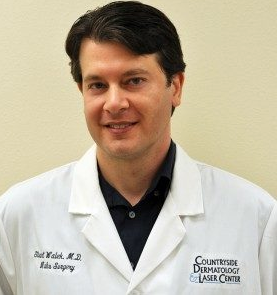
Dr. Stuart Walek, MD
Physician
Dermatology
Specialty
Dermatopathology,
Mohs Surgery
About Dr. Stuart Walek, MD
Dr. Stuart A. Walek, M.D., MPH is Board Certified in Dermatology and a Fellow of the American Academy of Dermatology.
Dr. Walek has a special interest in the diagnosis and treatment of skin cancer and has extensive clinical experience with skin cancer surgery, including Mohs surgery.
Procedures & Services
Patient Education Resources
Does the food I eat affect my acne?
There is some evidence to suggest that diet can play a role in the development of acne. Studies have found that a diet high in sugar and processed foods can increase the risk of developing acne. Diets...
There is some evidence to suggest that diet can play a role in the development of acne. Studies have found that a diet high in sugar and processed foods can increase the risk of developing acne. Diets...
How do I find out if I have skin cancer?
The best way to find out if you have skin cancer is to have a skin examination performed by a healthcare professional such as a dermatologist. They will visually inspect your skin for any suspicious m...
The best way to find out if you have skin cancer is to have a skin examination performed by a healthcare professional such as a dermatologist. They will visually inspect your skin for any suspicious m...
How is atopic dermatitis different from eczema?
Atopic dermatitis and eczema are often used interchangeably, but they are not exactly the same thing. Atopic dermatitis is a type of eczema.Eczema is a general term that refers to a group of condition...
Atopic dermatitis and eczema are often used interchangeably, but they are not exactly the same thing. Atopic dermatitis is a type of eczema.Eczema is a general term that refers to a group of condition...
What are some treatments to get rid of warts?
The best treatment for warts will depend on the type and location of the wart, as well as the patient's overall health and preferences. Some common treatment options for warts include:Salicylic ac...
The best treatment for warts will depend on the type and location of the wart, as well as the patient's overall health and preferences. Some common treatment options for warts include:Salicylic ac...
What is the best brand of botulinum toxin to improve my appearance?
Botulinum toxin is a type of neurotoxin that is used for a variety of cosmetic and medical purposes. There are several different types of botulinum toxin available on the market, each with their own u...
Botulinum toxin is a type of neurotoxin that is used for a variety of cosmetic and medical purposes. There are several different types of botulinum toxin available on the market, each with their own u...
Education & Training
Dr. Walek received his undergraduate degree from Duke University with a major in Chemistry. He then graduated from Duke summa cum laude and in the top 1% of his class. Dr. Walek then obtained his MD degree from Tulane University Medical School.
He also completed an additional fellowship year in Pathology with a focus on Dermatopathology. He also received a Master of Public Health (MPH) degree from the Tulane University of Public Health and Tropical Medicine.
Following medical school, he did an internship in Internal Medicine at the University of Texas in Houston and completed his Dermatology residency at the Tulane University Medical Center.
He also completed an additional fellowship year in Pathology with a focus on Dermatopathology. He also received a Master of Public Health (MPH) degree from the Tulane University of Public Health and Tropical Medicine.
Following medical school, he did an internship in Internal Medicine at the University of Texas in Houston and completed his Dermatology residency at the Tulane University Medical Center.

